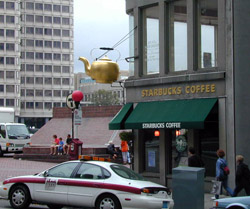There are several ways how you can find Armenians in the U.S.A. If you are in an American city, you can see Armenians in several places: 1. Cafes, where Armenians like to gather (for instance, “Starbucks” cafe in Boston, where native Armenians and Diaspora Armenian like to have coffee), 2. in Armenian Churches (Washington, New York, Los Angeles. Where there are no Armenian Churches, you can find Armenians in Greek Churches. For instance, during an Armenian traditional ceremony and Armenian apostle was invited from Los Angeles to a Greek Church in Sault Lake City), 3. in soccer fields (American Armenians gather to play football once a week), 4. You don’t have to look for the Armenian community; they will find you themselves. This is true especially in small cities, where you can find new Armenians often (for instance, in Indianapolis an Armenian student looked for Armenians for a long time, but couldn’t find. However, some time later he met Armenians During a Russian party, they quarreled and were arrested so fast that the student was not able to find out whether there were more Armenians at the party or not).
Personally, I don’t like sports much, but once when I was walking I heard someone crying words in Armenian. I approached to a stadium, where I saw 20-40 Armenians playing football. I watched the game till the end and got acquainted with those Armenians. I found it out that they used to gather at the stadium once a week and play football. They were friends and used to go to a beer house to have some beer. Those people were mainly representing a group of Americans that were educated and had a wonderful career. They asked me not to publish their names. I talked to them about the Armenia-Diaspora congress. It turned out that all of them were informed about the developments in Armenia and were following the situation in the Internet. They told me that it was not by chance that journalists saw some participants sleeping during the forum. Those participants were American Armenians that had changed their time zone and slept during the forum. They thought that it would be better to invite those participants several days before the forum so that they could get used to the new environment.
Some of them think that it is already late to think about the ties with the Diaspora and they had to figure out its role long before. They say that now Diaspora Armenians mostly provide financial support and other benevolent help (they were representing different fields). However, they thought that the meaning of the Diaspora was not the support, but the people. You can find brilliant specialists of different professions in the U.S., who will agree to change with his experience with Armenia. They know the American reality and what is happening in Armenia now. They can tell Armenia the “formula of success”. The Diaspora is a very big human resource, which necessity Armenia does not realize yet.
What does Armenia need today? When they heard this question, they smiled. They replied that it was a big state policy. They spoke about the main issues that should be solved and added that our country should not stop its active participation in the energetic system and should plan to construct a new atomic station, with the help of the Diaspora obtain a sputnik to develop its information technologies and totally revise its policy in three fields; health care, education and social. Those achievements will help Armenia to form a social group, which will be able to take it out of crisis and develop it. It will help to bring up a new generation of politicians and form a new national way of thinking. Thus, it will help to have a “public” society, but not a stagnated civic society.
Meanwhile, the American Armenian “professionals” predicted that there would be one more mass migration from the country in 2007. There are many negative factors such as slow reformations, partial economic growth, poverty in villages and the elections without democratic principles will make people leave for the U.S. and Europe.

